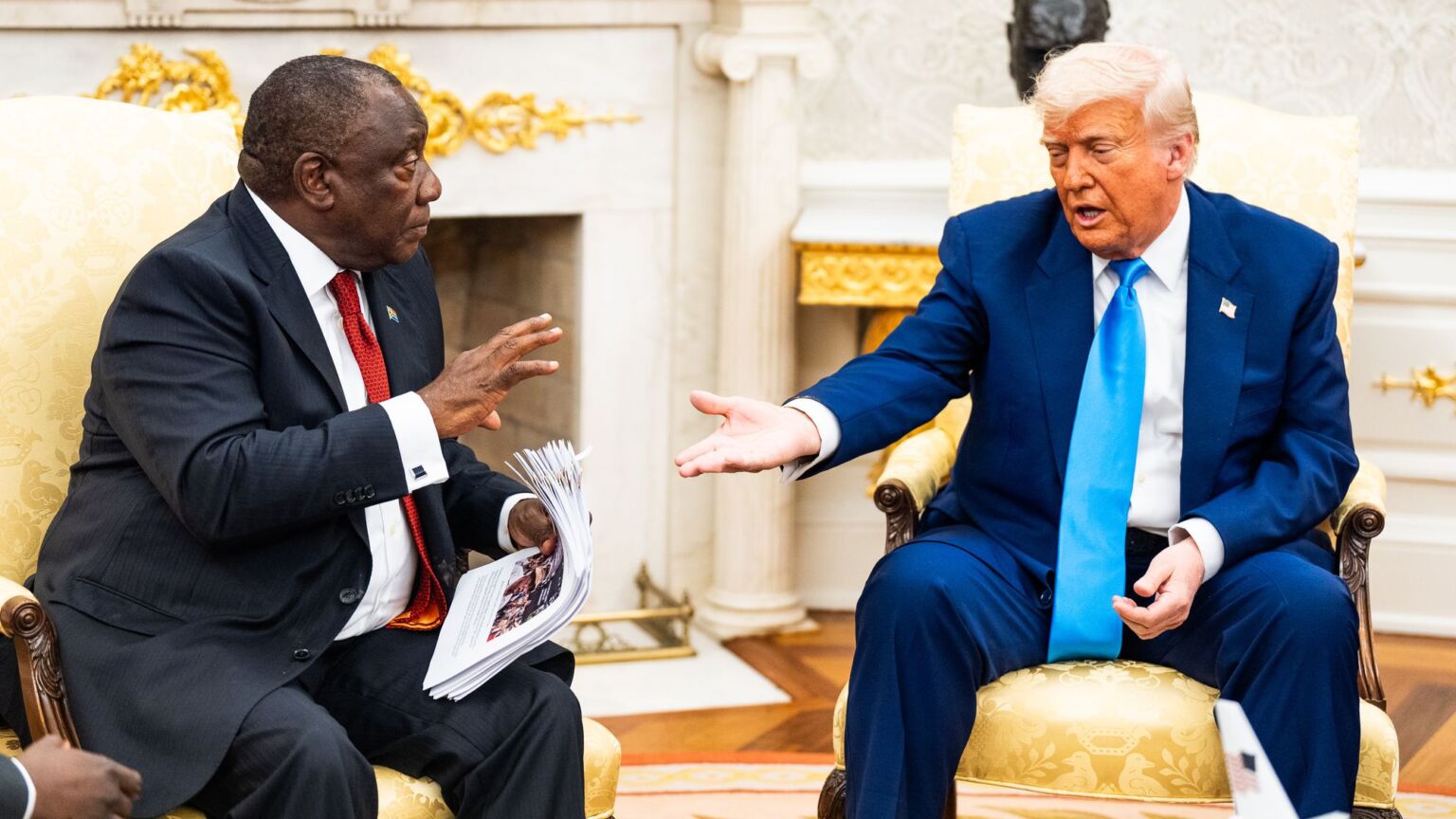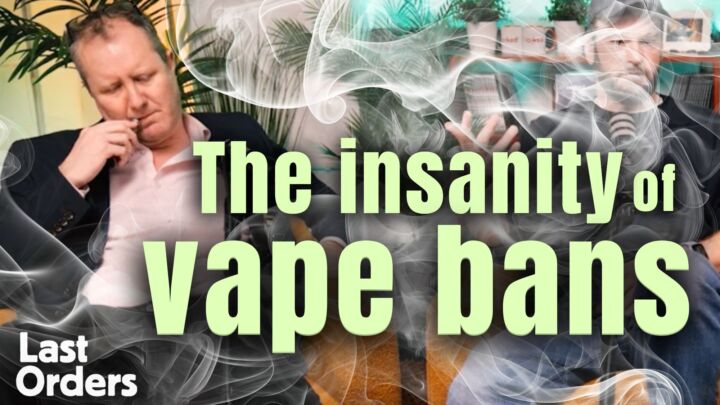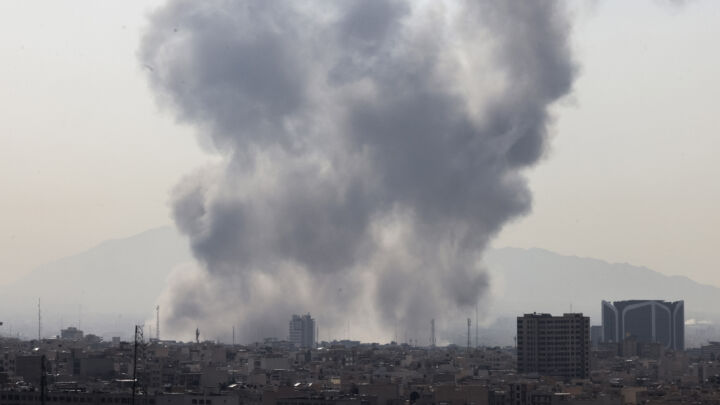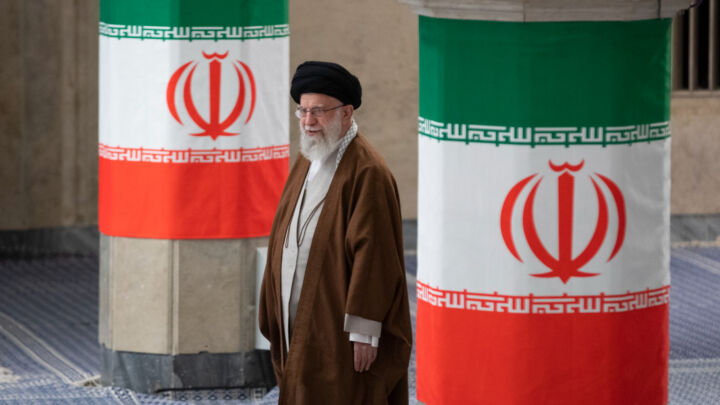There is no ‘white genocide’ in South Africa
Trump’s alarmism obscures the very genuine threats facing Afrikaner farmers.

Want unlimited, ad-free access? Become a spiked supporter.
South African president Cyril Ramaphosa is the latest world leader to be given an explosive dressing down in the Oval Office. This week, US president Donald Trump confronted Ramaphosa about a supposed genocide being waged against white, mostly Afrikaner, farmers. Trump’s team dimmed the lights to show a video about land seizures and presented the South African president with a packet of printed articles about white farmers being murdered. This came shortly after 59 white Afrikaner ‘refugees’ arrived in the US earlier this month.
According to Trump, all of this amounts to a ‘genocide’ of Afrikaners. He claims that South Africa’s black-majority government – currently led by a coalition of Ramaphosa’s African National Congress (ANC), along with nine other parties – is plotting to seize white-owned farms and is failing to stop ‘violent attacks on innocent disfavoured minority farmers’. One of his top advisers, South Africa-born Elon Musk, has further inflamed tensions by claiming that some South African politicians are actively promoting a ‘white genocide’. But is this really a fair representation of what is happening in South Africa?
The charges of genocide have understandably provoked outrage in South Africa. Ramaphosa has rightly denied Trump’s accusations and labelled it as ‘misinformation’. He is correct – there is no ‘white genocide’ or ‘ethnic cleansing’ against Afrikaners. This claim rests on the conflation of a number of issues, including the government’s expropriation laws, an opposition leader’s anti-Afrikaner slogans and a spike in attacks on farms, most of which are white-owned.
This is not to downplay the very real dangers facing Afrikaners – and indeed all South Africans – due to ANC-led dysfunction and corruption. After 30 years of ANC misrule, South Africa has become a zombie state. It cannot provide consistent electricity, clean water, education and jobs to most of its increasingly impoverished population. While the black majority suffers most, white communities – including Afrikaners – are also affected. What makes them particularly vulnerable is their unjustified pariah status inside and outside South Africa.
Afrikaners are caught between a rock and a hard place – between the threats they face today and their long history in South Africa. Afrikaners are a recognised minority that has every right to protect their language, culture and community. But Afrikaners are today seen as tainted by a past association with Apartheid. This has made them easy scapegoats for current problems.
The totalitarian nightmare that white minority-rule represented for black South Africans cannot be overstated. Meanwhile, for whites in general and Afrikaners in particular, Apartheid was manna from heaven. Privileged access to jobs in the civil service, state-owned enterprises and cheap supplies of black labour to the agricultural and industrial sectors ensured living standards that no other middle- and working-class population enjoyed in the West. White privilege was real and a daily humiliation for black South Africans.
That was then. What is never acknowledged is how Afrikaners chose to embrace the post-Apartheid world rather than take up arms against it, as was widely and wrongly feared at the time. It may be the case that some Afrikaners still resent the end of Apartheid. But that past association is being exploited by all manner of political opportunists – from the ANC and other black nationalists to Western leftists – to distract from the fact that it is the ANC that is responsible for the failure of the post-Apartheid state.
The land question crystallises this perfectly. Today, white commercial farmers – the majority of whom are Afrikaners – still possess about half of South Africa’s land and produce 90 per cent of its agricultural products. In 2024, South Africa’s agricultural exports were worth a record $13.7 billion.
This is, indeed, a legacy of racism. South Africa’s racialised land ownership goes back to British imperialism, when the Natives Land Act was passed in 1913. This condemned black Africans to only seven per cent of the land, increasing to 13 per cent in the 1930s. This act was partially motivated to placate Afrikaner farmers after their defeat in the Boer War. It was also primarily to drive the African majority from their ancestral lands, creating a pool of cheap labour to meet the demands of the emerging gold and diamond mines and white-owned farms. This was the brutal and bloody birth of a modern but racialised capitalist economy.
Nevertheless, blaming the Afrikaners today for the failure of black advancement in South Africa is like blaming contemporary Germans for their country’s Nazi past.
The situation today is far more precarious for Afrikaner farmers. They have every right to be concerned, especially with the passing of the Expropriation Act 2024. This piece of legislation results from political pressure by Julius Malema, the leader of the radical Economic Freedom Fighters, South Africa’s third-largest opposition party. In 2018, Malema succeeded in getting the National Assembly to pass a motion to amend the constitution to intensify land redistribution, by introducing ‘expropriation of land without compensation’.
Of course, every government in the modern world has laws that enable expropriation with compensation, as this is crucial to state infrastructure projects. However, the South African version replaces the traditional requirement for land seizure of ‘public purpose’ with a broader justification of ‘public-interest purpose’. According to the constitution, this ‘public interest’ includes the nation’s commitment to land reform and bringing about equitable access to natural resources. This could open the door to seizing Afrikaner farms in order to ‘redistribute’ their land to black South Africans.
Malema has also become notorious for repeatedly singing the slogan ‘Kill the Boer, kill the farmer’ at his rallies. The song was first popularised during the anti-Apartheid struggle, although it is no longer sung by the ruling ANC. In 2011, Ernst Roets, a prominent member of Afrikaner civil-rights organisation AfriForum and now head of Lex Libertas, a think-tank, brought a high-profile hate-speech case against Malema over the song. The case was partially inspired by the brutal murder of two white women, 76-year-old Alice Lotter and her 57-year-old daughter, Helen Lotter, on their farm in Allenridge, Free State. The attackers subjected the women to horrific torture, reportedly using broken glass bottles to inflict injuries before killing them. According to Roets and widely circulated reports, the words ‘Kill the Boer’ were written in the victims’ blood on the wall of their home.
Initially, the lower courts agreed with Roets and AfriForum that the chant incited violence against white farmers, in particular Afrikaners, and constituted hate speech. However, the Equality Court dismissed the case in 2022 and the Supreme Court of Appeal upheld this ruling last year. The Constitutional Court has since declined to hear another appeal.
All this has only inflamed Afrikaner anxiety. And no wonder, given that farm attacks have soared in recent years. In 2023, there were almost 300 farm attacks, in which 49 people were murdered. In just the period between October and December last year, 12 people were killed in attacks on farms. While there is clearly a racial component to some of these farm attacks, farms are also easy targets for criminals, due to their isolation and the presence of large amounts of cash.
It is impossible to ignore the fact that violent crime affects all South Africans. South Africa has the third-highest murder rate in the world, and can experience 450 homicides in a week. The vast majority of those victims are black. Crucially, the pervasive corruption within the police force stops crimes from being solved across the board, regardless of the victims’ race. None of this constitutes a campaign of state-sponsored genocide or ethnic cleansing.
In the context of growing social polarisation, Afrikaners have every right to be concerned about the future. An Afrikaner diaspora had been growing long before Trump welcomed refugees to America. Driven by anxieties about the future and facing job discrimination through black-empowerment legislation, many younger Afrikaners are opting to leave. According to Statistics South Africa, the emigration figures of Afrikaners have surpassed those of English-speaking whites.
None of this suggests that Musk and others are right in describing Afrikaners as facing a ‘genocide’. But the signs of discrimination and scapegoating are ominous. Holding Afrikaners culpable for present-day problems in South Africa is grotesque and irresponsible. After over a quarter of a century of ANC misrule, the past is being mobilised to deflect attention from the institutionalised graft, corruption, greed and moral turpitude of the ANC. The Afrikaners are sitting ducks.
The dilemma facing the Afrikaners appears intractable. Their plight has been politicised by the Trump administration, which could make things a lot worse for those who do remain. Leaving and taking refuge in the US might ensure survival, but it could also hasten the demise of the culture they desperately want to uphold.
Whether they stay or leave, Afrikaners face an impossible choice. Whatever they do, they are being punished for a past that South Africa’s rulers would rather exploit than overcome.
Dr Norman Lewis is a writer and visiting research fellow at MCC Brussels. His Substack is What a Piece of Work is Man!.
You’ve hit your monthly free article limit.
Support spiked and get unlimited access.
Support spiked and get unlimited access
spiked is funded by readers like you. Only 0.1% of regular readers currently support us. If just 1% did, we could grow our team and step up the fight for free speech and democracy.
Become a spiked supporter and enjoy unlimited, ad-free access, bonus content and exclusive events – while helping to keep independent journalism alive.
Monthly support makes the biggest difference. Thank you.









Comments
Want to join the conversation?
Only spiked supporters and patrons, who donate regularly to us, can comment on our articles.